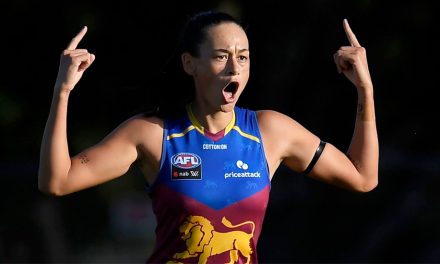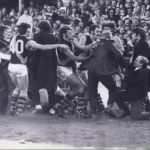A goal umpire is presented with a tight call during a match between Melbourne and St Kilda. Image: CHANNEL SEVEN
The AFL has got its TV umpire process completely wrong and needs to overhaul it.
The problem with the AFL Review Centre (ARC) isn’t the technology itself (although it could definitely use an upgrade with camera/angle quality, at least, to lessen the instances of inconclusive calls). The problem is with the way it’s implemented.
Why is it that under the current rules, umpires, goal umpires and the score reviewers themselves butt their noses into every single close call to determine whether a goal or a point has been scored, or if a team has failed to score altogether?
And sometimes they’re not close calls at all.
Opening Round provided two glaring examples of how overused the ARC has become by the umpires.
In the first quarter on Friday night at the Gabba, Brisbane star Dayne Zorko soccered through the Lions’ third goal clear as day. Yet, the goal umpire for some reason saw fit to send it upstairs to make sure it in fact was a goal and wasn’t touched by Matt Cottrell and/or Adam Saad.
Everybody watching at home, and most fans at the ground, could see neither Cottrell or Saad laid a finger on Zorko’s kick, and just one look at their reactions would’ve served as a dead giveaway that neither player touched the ball.
But, no, the goal umpire had to make absolutely sure and waste everybody’s time by getting the ARC to confirm the bleeding obvious.
And on Saturday it got worse up on the Gold Coast. In the third quarter of Richmond’s clash with the Suns, Tigers forward Noah Balta kicked what seemed like a straightforward goal from the goal square, but the goal umpire disagreed.
You see, the goal umpire thought it might have been touched by Connor Budarick even though the Gold Coast defender was nowhere near the ball. The TV replays further underscored what a ridiculous review it was and everyone’s initial suspicions that it was in fact a straightforward goal from the goal square.
Why have the helicopter parents at the AFL taken on this responsibility themselves? The micromanaging ARC also reviews every single goal as the ball makes its way back to the centre circle for the restart.
All up, it just adds unnecessary, frustrating and unwanted delays to the game.
The league has got it all wrong in its approach. It should take a leaf out of the book of sports such as cricket, basketball and tennis. In those sports, the onus is put completely back onto the competing teams/players to challenge calls that they don’t agree with.
PLEASE HELP US CONTINUE TO THRIVE BY BECOMING AN OFFICIAL FOOTYOLOGY PATRON. JUST CLICK THIS LINK.
Each team/player is given two or three unsuccessful reviews per innings, match or set. Use them all up, and they can no longer challenge calls. That’s it. It is a much better streamlined way of handling technology and maintaining the flow of a match as much as possible.
In cricket and basketball, umpires/refs themselves can still confer and send a decision upstairs/review a call on the sidelines if they are genuinely not sure about a call, but the beauty of the AFL challenge system is that it relates solely to score reviews. By giving each team two unsuccessful reviews per match, goal umpires can go back to the good old days before the introduction of technology and pay goals/behinds as they see them without worrying about getting a close call wrong.
It would no longer be their responsibility to send a call upstairs and we would all get on with the game as we had done for well over 100 years. If a goal umpire does get it wrong but the affected team opts against reviewing it, that is the team’s problem.
You “believe it’s a goal”, hey? Well, guess what goal umpie, in this overhauled system, the shackles are off and you can pay the goal without needing to check it every single time there might be a slight element of doubt. It would no longer be your concern.
Under this writer’s proposed system, there is no way either Carlton or Gold Coast would’ve reviewed the Zorko and Balta goals, saving us all valuable time. They would’ve just got on with it. Not only because they would’ve known they were both goals, but also because they would only have two reviews to play with and would have to use them wisely.
Saving reviews until later in the game in case the contest became a tight affair would be the best way to go about it, unless an absolute howler occurred before then.
The only way to cut out all of these extra unnecessary reviews/delays is to put the power of the review solely into the hands of the competing teams and completely relieving umpires of this responsibility.
The byproduct of this proposed system is that it would potentially create extra drama and storylines, especially in close games. For instance, if a team uses up its reviews but is dudded by a controversial goal late in the game that costs it the win and can’t challenge it, it would have to suck it up because it was its own fault for using up all of its reviews.
The AFL has wasted so much money already on a worldwide fact-finding mission, when the answer to its problems is so simple: leave it to the players.











